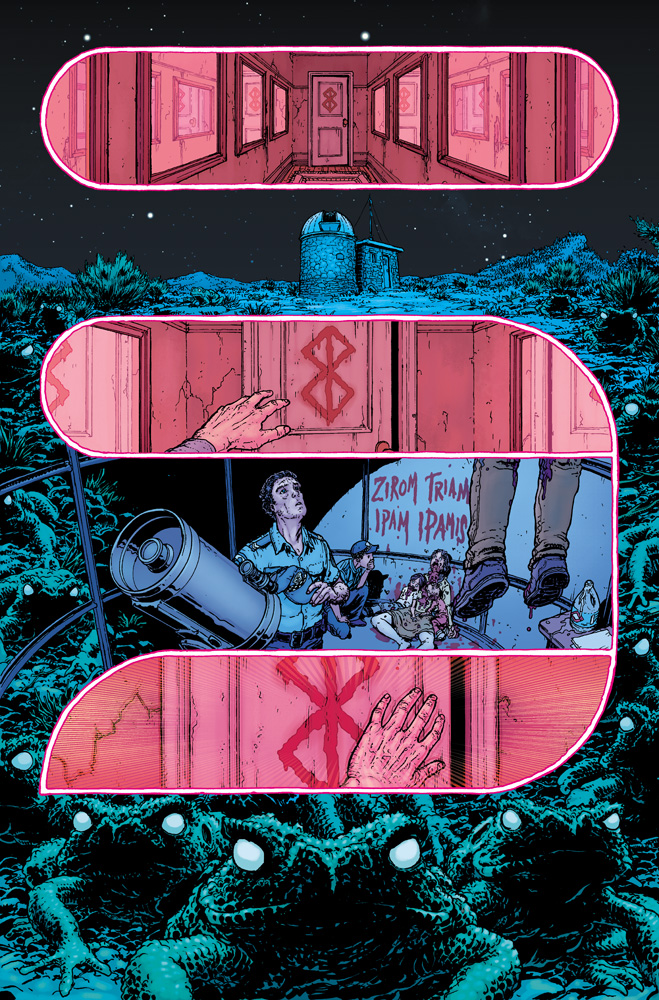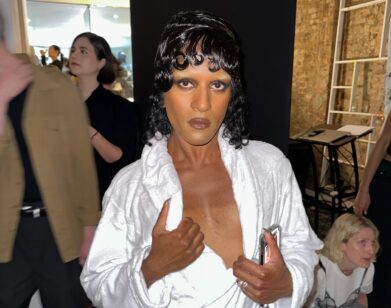Grant Morrison
I love people . . . I want them to rise up. Grant Morrison
Many years from now, we may have to explain to the comic-crazed children of the world that, originally, the term geek had no superheroic connotations at all. Back in the day, we’ll explain, geek referred to one who, finding no communion in the jockish world around him or her, turned inward, to comics, games, coding, the guitar, et al.—infinitely expanding personal pursuits with built-in arcana decipherable only to fellow initiates. To be a geek was to be an outsider, or rather, an insider of an implicitly miniscule community of peers. Today’s geeks, on the other hand, are the Iron Man übermenchen of popular culture and heroes of Hollywood blockbusters. And one of those responsible for the shift, for switching the geeks’ self-image from that of meek, powerless introvert to their present rock-star-of-the-real-world reality, is Grant Morrison.
Morrison’s comic series The Invisibles, which debuted in 1994 and is now considered by some to be the greatest of all time (and cited as an inspiration for, among zillions of other things, The Matrix), tells the story of a secret society of misfits bound together to fight an evil force in a time- and space-spanning continuum, sometimes stopping in contemporary London. Weaving together voodoo, fairy tale, magic, the Marquis de Sade, and more, The Invisibles made a grand synthesis of Morrison’s many personal inspirations and beliefs—and made a cult hero of its then 34-year-old author. By injecting himself and his own experiences into a kind of punk rock superhero story, as The Invisibles‘ bald-headed yogi badass leader, King Mob, Morrison broke the fourth wall, and broke through the format of his medium—just as he’d famously broken through multiple dimensions of space and time during a spiritual reverie on a rooftop in Kathmandu in 1994 that inspired much of the series—to become a kind of sage, a guru, the king of the geeks.
Morrison was born in Glasgow in 1960 and as a boy often accompanied his activist father on protests and illicit sorties onto nuclear missile bases while his father sneaked photos for underground newspapers. While at the all-boys Allan Glen’s School in Glasgow, Morrison turned to comic books and relished the way in which their superhero protagonists functioned as surrogates for his own fantasy life. In short order, he began creating his own strips, and by age 17, was getting hired to write his first stories professionally. In the 1980s, Morrison gave up on another early love, playing in a punk band, only to go on to become a charismatic frontman of the comic world with his outré series and his runs writing superhero comics, from Animal Man and Swamp Thing to All-Star Superman and Batman, as well as 1989’s Arkham Asylum. From The Invisibles on, Morrison, along with a revolving gang of illustrators who bring his scenarios to life, has put together as wild and as singular a body of work as any writer in any medium—and produced some singularly dark visions of humanity, of which his two newest series, Nameless (Image) and Annihilator (Legendary), may be the darkest yet. “More nihilism,” he says, laughing, from which he hopes to yield his optimistic “poetry.”
But even if he has created some of the bleakest dystopias in pop culture, Morrison the man is driven by a kind of impish humor and humanism. He half-jokingly believes the dawn of superhumans to be upon us, and he seems to have an insatiable, almost evangelical, need to transmit some of his hard-won hopefulness to the world. This past August, Morrison got on the phone with his friend and fellow comic fiend James Gunn, director of summer’s huge hit Guardians of the Galaxy, to talk about fans, films, and that rooftop in Nepal. —Chris Wallace
JAMES GUNN: Hey, Grant, how you doing, man? Are you in your castle right now?
GRANT MORRISON: Yeah, I’m looking out the window. Scotland is beautiful today. The water is blue. The sky is blue. The sun is shining. It’s unbelievable; it’s like Disney.
GUNN: When I was a small child, I partially learned to read with comics, in particular with Scamp, about the Lady and the Tramp’s male child. That was the prime comic that made me fall in love with comics as a kid. Was there that prime comic for you as a child?
MORRISON: They had this thing, Marvelman, which Alan Moore eventually did a deconstructed version of [later know as Miracleman]. It was just all these weird stories, but with superheroes. That one stays with me forever, from when I could barely read.
GUNN: That’s a lot cooler than Scamp.
MORRISON: It’s cool at least. [laughs]
GUNN: And then you started writing comics professionally when you were 17 years old—when I was doing beer bongs and riding around on the backs of cars in Missouri. What gave you the balls?
MORRISON: You were living, you were gathering material. I was sitting in the house. I went to boys school, a little, working-class kid from a pretty bad part of town. And I won a scholarship to this really prestigious boys academy. When you’re 12 years old, that seems cool, and then when you’re 14, you’re crying in the fucking walls, and you’re thinking, “Where are the girls, where are the girls? Oh, Jesus Christ.” But the thing I loved about the boys’ school was the sense of rebellion. It was really cool. It was like Lindsay Anderson’s If…. [1968]. We climbed out of windows. We destroyed property, and that rebellion was thrilling—it kind of took the place of sexuality.
GUNN: I went to a boys school too. And, for me, it allowed me to put humor at the center of everything.
MORRISON: Absolutely. I don’t think people realize that, together, boys just try to make each other laugh all the time. Boys put on silly voices and pretend to be characters. Girls talk about serious shit and relationships and all that stuff. Boys are actually quite primitive; it’s really funny and creative.
GUNN: I went to co-ed grade school, and it was really about who excelled in athletics. There’s a sort of sexual heat that comes with that. And I didn’t give a shit about that by the time I got to high school because I wasn’t good at it. [Morrison laughs] But you put yourself out there at 17 as a comic book writer. How did you get discovered?
MORRISON: I was growing up in Thatcher’s Britain, and I was desperate. I was a poor kid; my father had been to jail for demonstrating on his political beliefs. So I just wanted to earn a living. And I found a way to use my meager talent to tell stories to earn a living. I got into it really quickly, honestly. It’s like punk rock—I was 17 years old and comics were waiting for me. It was a great time to be doing this stuff. I was getting work from a kind of underground Scottish magazine called Near Myths, and then doing some commission work for [Scottish publisher] D.C. Thomson’s Starblazer series. I was coming out at the same time as Alan Moore, Peter Milligan, and Bryan Talbot. And everyone was kind of primed—all these British guys had grown up reading American comics and were so primed to get in there and take over and say what they felt about that stuff.
GUNN: When I went to your place in L.A., you were showing me one of your scripts in which you had drawn out all the comic book panels. Every other comic book script I’d seen—Alan Moore’s stuff, Marvel stuff—was written out. Is that something that only you do?
MORRISON: I can’t speak for the other guys, but I always come at it from the image, from the page, and from the layer, the construction of that thing. When you’re writing scripts, do you see the movie? Do you come at it through words or through your vision?
GUNN: When I write a screenplay—and I think it’s one of the reason’s why it was frustrating for me just to be a screenwriter—I’m not thinking of it in terms of words on a page, I’m thinking in terms of visual images, basically a comic book. I’m thinking of it in a series of shots.
MORRISON: I think that’s how David Lynch feels. All of us, we start with an image. We start with this weird subconscious feeling that summons a certain emotion, a certain state of mind …
GUNN: Writing a comic book series, you’re so reliant on whoever the artist is. It truly is collaboration. Is that something that restrains you, or do you feel it frees you up in certain ways?
MORRISON: It depends. I’ve always been lucky to work with people who are very good. I try to choose my artists when I can. But even when you can’t do that, it’s someone’s take on the story. Remember William Burroughs talked about the “Third Mind”? It’s the idea that, when two collaborators come together, they make something more than the sum of their parts. Even when the collaborator isn’t exactly on your wavelength, there’s always something new conveyed. So I’m not interested in a finished product, I’m interested in the ongoing developmental feeling of projects. Which is why I can never finish anything, really.
GUNN: One of the big reasons that I’m attracted to your work is that it has this through line of metafiction and postmodernism. Some of the big influences on me have been people like [Jorge Luis] Borges and [Thomas] Pynchon and Donald Barthelme. Are those people you look towards?
MORRISON: Definitely Borges. I haven’t read the other guys at all, but I grew up with the idea of the author coming up as a character in his own work. I grew up on [The Singing Detective dramatist] Dennis Potter’s television dramas for the BBC.
GUNN: Yeah, he’s amazing. He’s one of my favorites.
MORRISON: Potter was always putting himself on the front line of his writing. So that was my thing. I don’t believe that the fucking Marvel universe exists. But I do believe that in this world we can conjure the most amazing things in two dimensions. So I’m kind of in a reaction to reality: What are we doing here? What’s a comic? What’s a story? I’m not trying to pretend Peter Parker exists somewhere.
GUNN: In a way, metafiction breaks down the story and makes it less real. But in another respect, by that very breaking down, it actually makes things feel more real than they would to begin with.
MORRISON: I think it acknowledges the power of story to change people’s lives. I was quite excited to discover [through personal conversations and comments online] that, in my All-Star Superman [“All-Star Superman #10”], the scene where he saves the little goth kid from suicide has actually saved real lives. That’s the only virtue of these ridiculous stories: You can pull out people’s feelings and point out how they can get better.
We make stories, we make beauty, enchanting the meaningless, boring, fucking molecular motion we live in. That’s magic. Grant Morrison
GUNN: Your comic series, DC’s The Multiversity, which weaves together the 52 alternate earths of the DC Multiverse, deals very directly with those sorts of alternate realities.
MORRISON: When Stan Lee did the first Spider-Man book, it was like he was talking directly to the reader and saying, “You may find Spider-Man a little bit corny, but stick with it.” I was kind of into that whole idea of the comic book talking to the reader and establishing this relationship, and then weaponizing that relationship and making it quite dark and fucked up. Multiversity is kind of about that, the ideas that we allow into our heads. We protect our money behind safes, we protect our security behind the Pentagon, behind giant walls. But we allow any kind of idea through our skulls into these private spaces. I wanted to write about that—why do we allow such intimate invasion?
GUNN: I find your interest in Aleister Crowley and chaos magic fascinating. It’s something I know nothing about, frankly. Do you still partake in that?
MORRISON: Sure. I mean, basically I’m super skeptical. My mother was very witchy and she read tea leaves and all that stuff, but nothing fucking interesting ever happened to me as a kid. I never saw a ghost. I never saw a spirit. I never did a Ouija Board. So when I read Aleister Crowley, I was very skeptical. I thought, “Well, if I do this ritual, what will happen?” So I did an Aleister Crowley ritual, and a very three-dimensional vision of a lion head appeared in my room. I was a totally straight kid, honestly. Until I was 32, I didn’t touch coffee, drink, anything. And I thought, “There’s something going on here.” After some more investigating, I think “magic” is causing very specific changes in consciousness. People have built up things that they call rituals or spells, where you can press a certain button and you will feel a certain way. That’s all it is. You can press a button and see the god Jupiter. You can press a button and feel like Aphrodite. You can press a button and feel like Papa Legba of Voodoo. It’s not supernatural. I’ve summoned up John Lennon as if the guy was a god. And all it meant was that I was pushing out everything from my consciousness that wasn’t John Lennon. It’s not summoning a ghost. You’re hypnotizing yourself into believing a certain thing, to change consciousness, without drugs.
GUNN: Alan Moore is interested in the same sort of stuff. Is that related or just completely coincidental?
MORRISON: I have no idea. I think anyone who’s interested in creation or in language will eventually come to magic. I’ve been doing it since 1979—he’s been doing it since 1993. [laughs] It’s good for creative people to get into these states. It’s like occupying a character.
GUNN: Considering how short your life is, your career has been very long and you’ve gathered this enormous crowd of fans. These people are fanatical—in fact, you even spawned a convention, MorrisonCon [a three-day comics event held in Las Vegas in 2012], which I appeared at.
MORRISON: You were great. You and [screenwriter] Max Landis fighting! [laughs] He was just being so fucking pedantic, my God.
GUNN: Max Landis was being ridiculous. Arguments about genre classifications are the least interesting to me. Like, “What makes a superhero movie a superhero movie?” Who gives a shit? It’s not like God came down and classified superhero movies.
MORRISON: Is Mary Poppins a superhero? Yeah, when Alan Moore does it, you know?
GUNN: Totally. How do you deal with the adulation?
MORRISON: I’m sure you know right now, because you’ve got this fucking amazing hit film that everybody loved—deservedly so—it feels good. Like most artists, I do feel sort of insecure and weird. So it’s nice that people love this stuff, but that’s not what it’s about. It’s about communicating—I’d like to do stuff that can reach the biggest audience and get the best reaction. But at the same time, I’m too old for the bullshit. Most of my time is spent back home. [laughs]
GUNN: One of the interesting things about your work, though, is its delicate balance between fucking with people and having the sincere desire to affect people in profound ways.
MORRISON: I love people, but you have to kind of slap them sometimes. I want them to rise up. I want them to fucking build spaceships and stop making war. But all you can do is use your work to say, “Please make spaceships—make the starship Enterprise, stop bombing Iraq.”
GUNN: I have a hard time placing those sorts of meanings on work.
MORRISON: We’re not diplomats, we’re not politicians. But if you care enough, these things are natural. If you care about people, you want to see them doing well, you want to see them going to the stars instead of killing each other. [laughs]
GUNN: You know, to this day, WE3 [Morrison’s 2004 “Western Manga” about three weaponized animals on the run] is my favorite short-form comic series, ever.
MORRISON: I love that thing. I wept as I was writing it.
GUNN: I cry every time I read it, and I’ve bought probably 30 copies for friends because no one I’ve ever given it to didn’t love it, non-comic fans as well. I love WE3. And, by the way, [producer] Don Murphy has been trying to get me to adapt it.
MORRISON: Honestly, you should do that movie. I know you love animals like I do. I want you to do that. I bet you could do it.
GUNN: I would love to. So, I want to talk about your spiritual awakening, of sorts, in Kathmandu. What was that?
MORRISON: I have no idea. I went to Kathmandu because I watched [BBC presenter] Dan Cruickshank on TV talking about Buddha’s journey through India, Nepal, and Tibet. My friend and I thought, “Let’s do that. Let’s spend some money, go to Kathmandu, and see what happens.” So we went there, and on the second to last day of our journey, I had this experience. Everyone thinks because I was on hashish, that it’s a drug vision, but I must say that I’ve tried every psychedelic drug—in the 1990s I tried everything, LSD, DMT—and nothing could reproduce this event. Basically, it played out like an alien abduction or a shamanic journey. I was taken out of my body, peeled off the surface of the four-dimensional universe of space-time, and taken somewhere else. I found myself in a huge, azure blue vault that felt infinite and enclosed at the same time, like a vaulted cathedral inhabited by morphing quicksilver blobs of intelligence. Somehow I was one of them, or at least I was part of a gestalt of minds that represented “one” of them. It was explained to me that I was in a higher mathematical space, where conventional time and space were simply directions, like up and down are in 4-D. From this vantage point, I could see from the Big Bang to the end of the universe, and it was all happening at the same instant. Shakespeare was working next to the dinosaurs, separated only by a fold or wrinkle in the surface of space-time. Cosmologists might call what I witnessed “the bulk,” which is conceptualized as a kind of higher-dimensional medium where universes like our own inflate and grow. Only in time do things grow, so they had to “make” time, that is, they had to build universes, like window boxes or incubators, where they could grow their young to maturity before setting them free from the box of time into timeless existence. Later I realized that comic books were a good way to visualize this perspective. If we laid out every Superman comic since the character’s creation in 1938, we would have a kind of aerial perspective of his entire existence. Superman’s life has been played out on the surface of the second dimension. We in the third can look down at every instant in his life, we can travel back and forward through his personal timeline and place a Superman image from 1942 next to one from 2014.
GUNN: Has that experience affected anything that you’ve done?
MORRISON: Well, it’s affected everything. Because I now believe magic is about meaning. If you look at the world as just dead, where everything is a meaningless motion of molecules, nothing has any value. But that’s not true, because every human being sees something important and gives it meaning. Human minds see significance and meaning in things. We make stories, we make beauty, enchanting the meaningless, boring, fucking molecular motion we live in. That’s magic.
GUNN: Chris Burnham, the artist of your new series, Nameless, has said that he was influenced by Lovecraft. Is that how you see it?
MORRISON: A little bit. We were trying to capture the feel and atmosphere of Lovecraft without doing Lovecraft. I’ve never really written an out-and-out horror comic before, so this is my attempt to put it all in one place. We were influenced by Mayan and Polynesian mythology and some fairly esoteric, dark-side occult ideas. It’s my most occult comic since The Invisibles and has its roots in the dark side of the Qabalistic Tree of Life—the Tunnels of Set, where the darkest areas of the human experience are given form. Basically, it’s about a down-and-out ex-services occult hustler who gets called in when astronomers discover an asteroid named Xibalba heading toward Earth. It’s really dark—more of that nihilism stuff. [laughs] You know how on True Detective Matthew McConaughey’s character, [Rustin] Cohle, says humans need to stop reproducing because we’re just creating more horror in the universe? All that material comes from The Conspiracy Against the Human Race, a philosophical treatise on pessimism by Thomas Ligotti, the horror writer who suffers from anhedonia. Ligotti, along with Ray Brassier, a Scottish philosopher who wrote a book called Nihil Unbound: Enlightenment and Extinction, is at the popular forefront of this new wave of pessimist, nihilist, or “speculative realist” thinking. Annihilator was heavily informed by these writers, and a lot of my interest in their work bled off into Nameless in a different way. It’s our contribution to the New Bleak, and we’re very excited about it. I wanted to know if my own optimism could stand up to the bleakest, most pessimistic, most corrosive ideas about the pointlessness and horror of being alive and self-aware in an entropic universe. I like dredging the darkest, sludgiest part of the well for misery that I can transform into poetry and humor, you know?
JAMES GUNN DIRECTED THE SUMMER BLOCKBUSTER GUARDIANS OF THE GALAXY. HE IS CURRENTLY WORKING ON A SEQUEL TO BE RELEASED IN SUMMER 2017.







